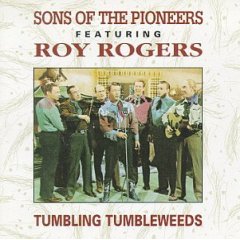| "Tumbling Tumbleweeds" | |
|---|---|
 | |
| Single by Sons of the Pioneers | |
| B-side | "Moonlight on the Prairie" |
| Written | 1929-1934 [1] |
| Published | July 12, 1934 by Sam Fox Publishing Co., Cleveland, Ohio, [2] Williamson Music, Inc. [3] |
| Released | November 10, 1934 [4] |
| Recorded | August 8, 1934 [5] |
| Studio | Decca Studios, Los Angeles [5] |
| Genre | Western Music |
| Length | 2:48 |
| Label | Decca 5047 [5] |
| Songwriter(s) | Bob Nolan |
"Tumbling Tumbleweeds" is a Western music song composed by Bob Nolan, a founding member of the Sons of the Pioneers. Nolan wrote the song in the early 1930s while he was working as a caddy and living in Los Angeles.[ citation needed ] It was first recorded by the Sons of the Pioneers in 1934, and it became one of the most famous songs associated with the group. Originally titled "Tumbling Leaves", [6] the song was reworked into the title "Tumbling Tumbleweeds" and into more widespread fame with the 1935 film of the same name starring Gene Autry. Members of the Western Writers of America chose it as one of the Top 100 Western songs of all time. [7]